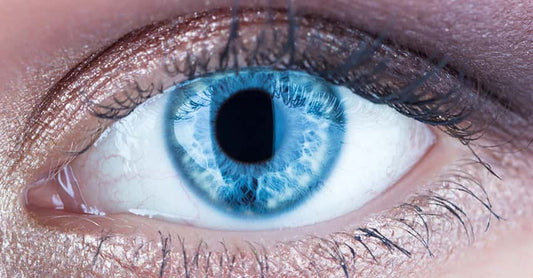When we think of blackcurrants, the mind tends to wander to things like jams and juices or picking berries off bushes. But did you know you can take blackcurrants as a supplement?
Health enthusiasts worship blackcurrants for their extensive nutritional profile and high levels of botanical compounds that benefit health.
These little berries seriously pack a punch. Perhaps their main claim to fame is their vast quantities of powerful antioxidants - much more than any other fruits - which helps fight aging and disease.
Here, we take a closer look at how black currants can benefit our health, particularly our vision.
Blackcurrants: Super Berries
Blackcurrants are small, dark purple, tart flavored berries derived from a shrub native to parts of Europe and Asia. They have been used in traditional herbal medicine to treat various ailments, thanks to their numerous medicinal properties.
Black currants are known as a super berry and have gained popularity amongst health fanatics because of their high nutrient content and concentrations of antioxidants, anti-inflammatories, and antimicrobials.
But it's not just the berries themselves that possess potent biological properties. The seeds and leaves of the blackcurrant plant can also be ground down to extract the same beneficial compounds.
Many of the health benefits of blackcurrants are linked to their concentrated source of anthocyanins, flavanols, polyunsaturated fatty acids (PUFAs), and phenolic acids 1. They are also packed full of vitamin C and other important vitamins and minerals. But how do these benefit our health?
Health Benefits Of Black Currants
Antioxidants
Oxidative stress occurs when there is an excess of free radicals in the body. These are highly reactive molecules that cause cell damage and contribute to aging and the development of diseases. They can also trigger inflammation, further increasing the risk of disease.
Antioxidants are produced naturally by the body and help neutralize free radicals to protect against cell damage - much like a security guard outside a venue who manages disorderly behavior.
The problem arises when there is an imbalance between the number of antioxidants and free radicals as a result of things like poor diet, alcohol, smoking, or exposure to toxins.
Blackcurrants provide a rich source of plant-based, biologically active antioxidants known as flavonoids. Within this class of compounds are anthocyanins, which are responsible for giving blackcurrants their vibrant purple color.
Fun fact: they are also consumed by some butterflies to give their wings a rich color!
Anthocyanins are linked with many health benefits but are most well known for their potent antioxidant effects. Black currants have four times the amount of anthocyanins than other berries, with observed levels as high as 300mg per 100g of fruit 2.
They also contain large amounts of vitamin C, which provides added antioxidant effects and is known as a free radical scavenger.
By limiting the amount of free radicals, anthocyanins and vitamin C can also boost the immune system and help fight infections and illnesses. According to research, blackcurrant seed oil can enhance the immune response of healthy adults 3.
Anti-inflammatory
The body's inflammatory response is necessary to help fight off infections, protect against injury, and repair damage in the body. While short-term inflammation in this way is beneficial, when inflammation persists, it can become chronic and attack your own body tissues.
Chronic inflammation underpins nearly all health problems and diseases, such as cancer, diabetes and arthritis. As such, it makes sense that trying to calm inflammation in the body as much as possible is key to living a long and healthy life.
Black currant seed oil is rich in gamma-linolenic acid (GLA), a type of omega-6 fatty acid. The body converts GLA into other polyunsaturated fatty acids known to help reduce inflammation and improve heart health and function.
Fatty acids reduce inflammation by inhibiting the production of molecules involved in the inflammatory response, such as cytokines. According to research, GLA from blackcurrant seed oil is extremely effective at treating joint conditions such as rheumatoid arthritis 4.
Source of Fiber
Blackcurrants contain both soluble and insoluble fiber, which are crucial for maintaining a healthy digestive system.
Soluble fiber dissolves in water to form a gel-like substance, slowing digestion and enabling your gut to absorb more nutrients. Insoluble fiber supports regular bowel movements and helps prevent constipation.
Control Blood Sugar
Insulin is a hormone secreted by the pancreas that regulates blood sugar levels. Black currants contain high levels of manganese, an important mineral for producing this important hormone.
People with type 2 diabetes do not produce enough insulin, so they have abnormally high blood sugar levels. This poses a number of serious dangers to health, including nerve damage.
Evidence suggests there is a link between low manganese levels and the prevalence of diabetes 5.
Vitamins and Minerals
Blackcurrants' nutritional profile is pretty impressive. They contain many essential vitamins and minerals, such as:
- Iron
- Calcium
- Phosphorous
- Magnesium
- Manganese
- Vitamin B1 (thiamine)
- Vitamin B2 (riboflavin)
- Vitamin B5 (pantothenic acid)
- Vitamin B6 (pyridoxine)
- Vitamin A
- Vitamin E
In addition to all of these, blackcurrants contain an enormous amount of vitamin C. To put it into perspective, black currants have four times as much vitamin C as citrus fruits and double the amount of antioxidants as blueberries. Hence the super berry status!
So why do we care so much about vitamin C? It is used by the body for many different functions, including growth and development, tissue repair, immune response, wound healing, and collagen formation. To name a few! It also exerts strong antioxidant effects.
Benefits for Vision
Protects Against Vision Loss
One of the most well-known benefits of blackcurrants is their positive effects on vision. In plants, anthocyanins help protect cells from light damage by absorbing blue-green light.
When we eat these fruits, anthocyanins can help protect our eyes from light damage similarly.
The leading cause of vision impairment and blindness are primarily age-related eye diseases such as cataracts, glaucoma, and macular degeneration. Poor blood flow to the eyes, inflammation, and oxidative stress can contribute to developing these diseases, which is where it's blackcurrants' time to shine.
The magical compounds discussed earlier called anthocyanins can help slow the progression of these diseases thanks to their anti-inflammatory, antioxidant and blood vessel dilating effects.
Dark Adaptation
Anthocyanins support the production of rhodopsin, a light-sensitive receptor protein found in the rods of the retina that enable our eyes to adapt to low light conditions.
According to one study, ingesting 50mg of blackcurrants resulted in a significantly improved ability for the eyes to adapt to dark conditions compared to people who consumed no berries 6.
Visual Fatigue
Anthocyanins cause blood vessels to relax, which increases blood flow to the eyes, delivering extra nutrients and oxygen for better eye health.
According to research, increased blood flow to the eyes can help improve eye function and reduce eye fatigue associated with looking at computer screens for extended periods 7.
How To Take Blackcurrants
Incorporating blackcurrants into your diet is easy! You can find it in a variety of forms, including:
- Dried fruit
- Oils
- Pills and capsules
- Powder
- Raw berries
If you like the sound of the health benefits of blackcurrants and are looking to get your hands on some, Performance Lab Vision is a great place to start.

This unique blend provides research-backed botanical nutrients to give you sharper, clearer vision while helping protect against light damage for long-range eye health.
Side Effects
There are very few side effects of taking blackcurrant supplements in any form, and they are generally considered safe. However, some people report mild side effects, including soft stools, diarrhea, and intestinal gas.
To avoid these, try sticking to the recommended doses below. And if you like eating the berries raw, don't gorge yourself!
- Four 250 milligram capsules per day, taken twice a day
- 5-10 milliliters of fruit syrup per day
- One glass of fruit juice per day
- 1-2 teaspoons of leaves, three to four times a day
Blackcurrant supplements are not recommended for people with bleeding disorders or those scheduled for surgery, as they can slow blood clotting.
Summary
Blackcurrants are packed full of nutrients, antioxidants, and anti-inflammatory compounds that provide numerous benefits to our health.
Perhaps the most important compound present in blackcurrants that is responsible for the majority of the positive effects is a flavonoid called anthocyanin.
Anthocyanin is known to help fight inflammation, protect against oxidative stress, and maintain many other aspects of health. Anthocyanins benefit our eye health in particular.
They protect against cell damage and diseases that cause vision loss, improve blood flow to the eyes to reduce fatigue, and provide the necessary building blocks to build proteins involved in adapting to darkness.
References
- Gopalan, Ashwin, et al. "The health benefits of blackcurrants." Food & function8 (2012): 795-809.
- Moyer, Richard A., et al. "Anthocyanins, phenolics, and antioxidant capacity in diverse small fruits: Vaccinium, Rubus, and Ribes." Journal of agricultural and food chemistry (2002): 519-525.
- Wu, Dayong, et al. "Effect of dietary supplementation with black currant seed oil on the immune response of healthy elderly subjects." The American journal of clinical nutrition4 (1999): 536-543.
- Khanna, Shweta, Kumar Sagar Jaiswal, and Bhawna Gupta. "Managing rheumatoid arthritis with dietary interventions." Frontiers in nutrition (2017): 52.
- Koh, Eun Sil, et al. "Association of blood manganese level with diabetes and renal dysfunction: a cross-sectional study of the Korean general population." BMC endocrine disorders1 (2014): 1-8.
- Nakaishi, Hitoshi, et al. "Effects of black currant anthocyanoside intake on dark adaptation and VDT work-induced transient refractive alteration in healthy humans." Alternative Medicine Review6 (2000): 553-562.
- Nakaishi, Hitoshi, et al. "Effects of black currant anthocyanoside intake on dark adaptation and VDT work-induced transient refractive alteration in healthy humans." Alternative Medicine Review6 (2000): 553-562.















